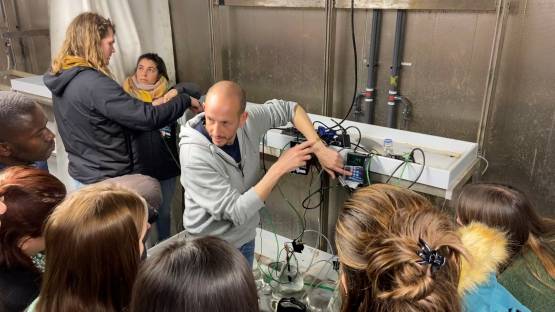Ocean acidification, often referred to as “the other CO2 problem”, was the focus of a dedicated training course for 19 early career scientists, jointly held by the IAEA and Swedish counterparts this month.
The ocean absorbs carbon dioxide (CO2) released by human activities. This sounds good at first, as it leaves less carbon dioxide in the atmosphere and substantially limits climate change. But at the same time, it causes changes in the carbonate chemistry and acidity of seawater, making the ocean more acidic. This is becoming a key global issue due to its potential to affect marine organisms and biogeochemical cycles.
The six-day course held on 14–19 March 2022 at the Kristineberg Center for Marine Research and Innovation in Fiskebäckskil was conducted by the IAEA Marine Environment Laboratories, together with the University of Gothenburg, the Royal Swedish Academy of Sciences, and the Northeast Atlantic Hub of the Global Ocean Acidification Observing Network. It provided participants from 11 countries in Europe with the knowledge necessary for measuring and manipulating seawater carbonate chemistry, setting up experiments, avoiding typical pitfalls and ensuring comparability with other studies.
The global community’s concerns about ocean acidification are reflected in the United Nations Sustainable Development Goal 14, under Target 3: “Minimize and address the impacts of ocean acidification, including through enhanced scientific cooperation at all levels.” For nearly 10 years, the IAEA Marine Environment Laboratories have supported countries in studying the impacts of, and addressing, ocean acidification through its Ocean Acidification International Coordination Centre (OA-ICC).
The OA-ICC, an IAEA Peaceful Uses Initiative, has a threefold mandate to communicate, promote and facilitate international activities on ocean acidification. Its capacity building programme leads training activities for scientists from IAEA Member States, providing them with both theoretical and practical knowledge on how to study ocean acidification and its impacts in their home countries.
Participants in the course in Fiskebäckskil were given the opportunity to perform some basic experiments in the laboratory, and through group work, came up with their own research proposals.
“I left the course feeling well equipped to produce high quality data and energized by networking with a diverse group of scientists," said Sarah Solomon, a participant from the Netherlands.
Since its inception, the OA-ICC has trained hundreds of scientists, improving scientific knowledge and data collection related to ocean acidification, building capacity to monitor and assess ocean changes worldwide. Over the years, the capacity building programme was adapted to the needs of Member States.
“Courses like this help advance science around the world, ultimately helping improve our understanding of, and shape our response to, ocean acidification,” added Sam Dupont, senior lecturer at the University of Gothenburg and an IAEA Expert.
The IAEA OA-ICC’s capacity building programme includes training courses like this one, as well as advanced and collaborative global research activities. The centre also provides daily updates on ocean acidification related news through its news stream, hosts a bibliographic database that includes the entire corpus of OA-related scientific literature, and also maintains a biological response data portal.
I left the course feeling well equipped to produce high quality data...






